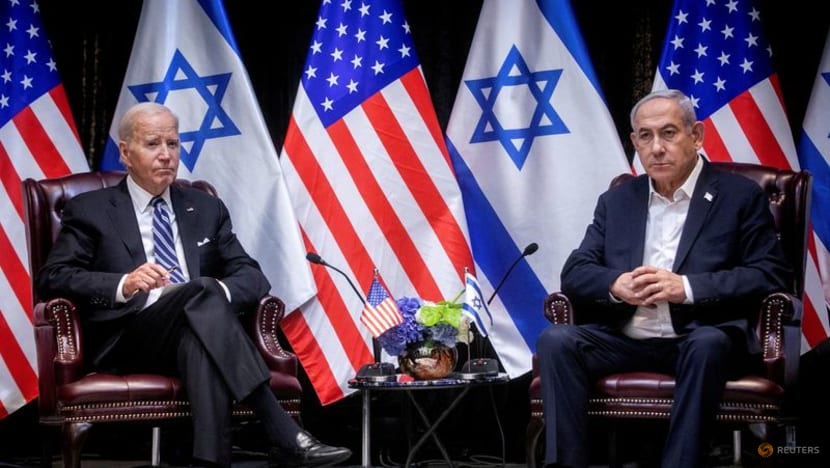Snap Insight: Rift between US, Israel becoming a chasm after UN Gaza ceasefire resolution
US President Joe Biden is trying to thread the eye of the needle, by putting some daylight between himself and Israeli leader Benjamin Netanyahu, says Carl Skadian, senior associate director at the Middle East Institute, NUS.

US President Joe Biden meeting Israeli Prime Minister Benjamin Netanyahu on Oct 18, 2023 in Tel Aviv to discuss the Israel-Hamas war. (File photo: Pool/Miriam Alster via Reuters)
SINGAPORE: Was the American abstention on the United Nations Security Council (UNSC) resolution calling for an immediate ceasefire in Gaza part of the tough conversation that President Joe Biden promised to have with Israeli leader Benjamin Netanyahu?
Or in Mr Biden’s own words, the “come to Jesus” conversation - where both sides need to have a serious talk and think about the consequences of Israel's actions.
While uncommon, it is not unheard of for the United States to stand by and allow resolutions against Israel to pass - both Democrat and Republican presidents have done so from time to time, the most recent being last December when the US abstained on a resolution calling for more humanitarian aid in Gaza.
What is clear from the latest US action - or, more accurately, inaction - is that the rift between the Biden administration and Mr Netanyahu is becoming a chasm.
A crucial distinction must be made here: Mr Biden is still a very staunch supporter of Israel. What he is doing, instead, is trying to thread the eye of the needle, by putting some daylight between himself and Mr Netanyahu. The US is not the only country attempting this high-wire act.
DEEPENING RIFT OVER GAZA
Before the UNSC vote on Monday (Mar 25), a deepening rift between Mr Biden and Mr Netanyahu spilled into public view with the US president openly embracing a strongly-worded speech by Senate Majority Leader Chuck Schumer criticising the Israeli government.
Senator Schumer, the highest-ranking Jewish official in the US, effectively waded into Israeli domestic politics by portraying Mr Netanyahu as an obstacle to peace, before calling for new polls.
In a US election year, with warnings about foreign interference flying, the remarks were startling. Even more revelatory: The speech was cleared with the White House before delivery, and Mr Biden praised it after.
This added to tensions already brewing from Mr Biden’s hot mic comment after his State of the Union address on Mar 7, in which he was heard saying that he and Mr Netanyahu needed to have a “come to Jesus” meeting about the war in Gaza.
Asked to clarify what he meant in an MSNBC interview two days later, Mr Biden said: “What I meant was, it’s an expression used in the southern part of my state meaning a serious meeting. I’ve known Bibi for 50 years. He knew what I meant by it.”
“What’s happening is he has a right to defend Israel, a right to continue to pursue Hamas, but he must, he must, he must pay more attention to the innocent lives being lost as a consequence of the actions taken,” Mr Biden said. “In my view, he’s hurting Israel more than helping Israel by making the rest of the world - it’s contrary to what Israel stands for.”
“I think it’s a big mistake,” the US president added. “I want to see a ceasefire.”
Mr Netanyahu, however, is not backing down. He criticised the US abstention on the Security Council vote, and then cancelled a planned visit by a high-level delegation to Washington to discuss a threatened offensive into Rafah - a meeting requested by Mr Biden.
Despite pressure from around the world, Mr Netanyahu has stuck to his guns and insisted that he will go ahead with the incursion into the southern Gazan city, where more than a million Palestinians have sought refuge.
PLAYING TO THEIR HOME AUDIENCES
In effect, both Mr Biden and the Israeli leader are playing to their domestic constituencies. Unbridled American support for Israeli actions since Hamas’ terrorist attacks on Oct 7 last year has been costly for the US president: Large sections of his base have criticised him, particularly in the more progressive swing states that will likely decide the outcome of the election.
It is a significant enough factor in US politics that even Mr Biden’s challenger, Donald Trump, offered a lukewarm endorsement of Israel, urging it to “finish up your war” and warning that the country was bleeding international support.
Mr Netanyahu, meanwhile, is deeply unpopular at home. To remain in power, he will need to continue down a path that retains the backing of his far-right governing coalition.
All of which is to say the promised “come to Jesus” moment has not arrived. Yet.
Israeli officials, including Defence Minister Yoav Gallant, have said that the Security Council resolution will not be implemented.
But the crunch is coming. The planned offensive in Rafah will likely be the flashpoint. The US has been clear that current plans for the incursion are a no go, and Mr Biden has several options available to him to get tough with Mr Netanyahu.
The UNSC abstention was one, but there are others in the quiver, including withholding further military aid.
As always, Washington will be critical in determining what Israel does next. The difference is that as November draws closer, the US administration has a big, and growing, stake in reining in the Israeli leadership.
Carl Skadian, a former journalist and editor for 30 years, is Senior Associate Director at the Middle East Institute, NUS.

















